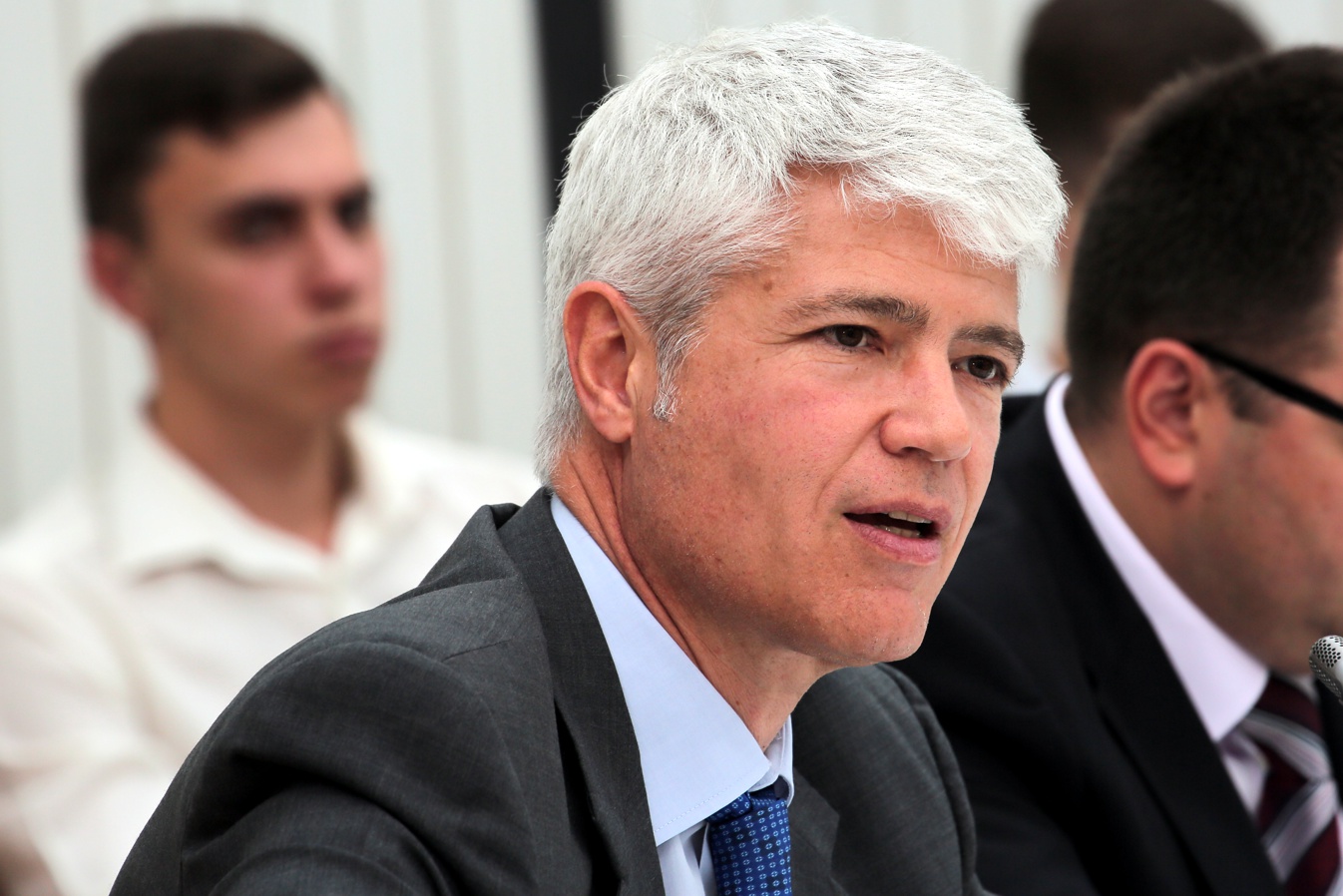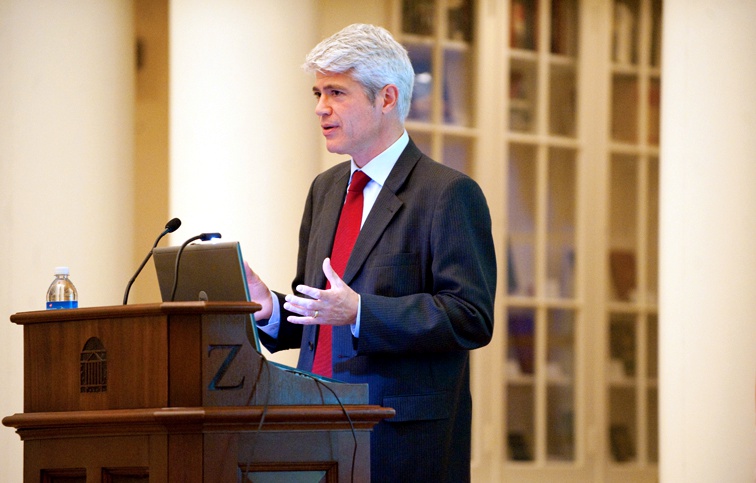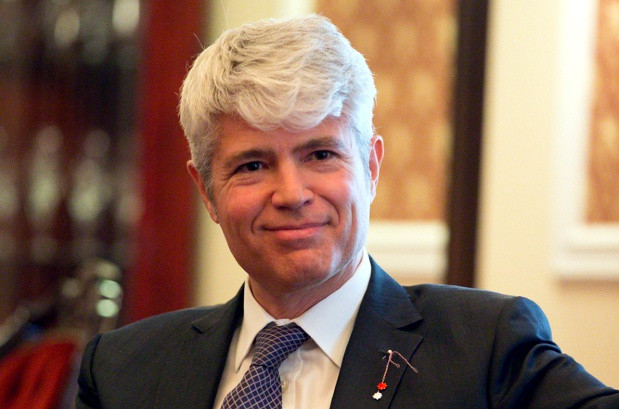What is your assessment of the decentralization reform in Ukraine?
Frankly speaking we are very pleased with the excellent cooperation with the ministers in charge. There are many positive reforms in Ukraine and certainly decentralization is one of them. It's not too much spoken about because it's a little bit less visible sometimes, especially here in Kyiv. But it's something going more through the regions and you don't feel it like you do with health reform or pension reform. We see excellent results of decentralization by the feedback from the regions. The fact that they have more financial autonomy is really good. We see the municipalities have really excellent understanding about their new financial capacity that they are receiving and put money directly into actions, for example for new schools, roads, clinics and so on. We still see a lack of action by some municipalities. Sometimes they don’t know what to do with this money that they are receiving directly. This is something we are working on. But those are exceptions; the high majority has excellent results. I think that citizens realize that decentralization is positively influencing their everyday life.
There's still much to do to strengthen the system, make it better. But if you think what has been done in less than two years, you understand that a lot has been achieved.
Ukraine has passed legislative acts required for launching the healthcare reform. What is your opinion on this reform?
We work very efficiently with the acting minister Suprun and the whole Ministry of Health. We are absolutely convinced in the reform she started, that has been adopted by the Rada. We think this reform goes in the right direction. There is no other alternative. It's a very good reform.
Healthcare reform is also generally speaking a priority for Switzerland since we have started our technical cooperation with Ukraine. First part of the program that is basically ending now was very much focused on women and young children, pregnancy. That is what we can do without the reforms, some actions that you can do outside the main political reform, and this was for many years a Swiss priority - working with the doctors, nurses and hospital managers to help pregnant women and children. And in this sphere a lot of things have been achieved. I just would like to mention one thing: in Ukraine the mortality of children by the age of one year has been strongly decreasing over the last years. Of course it's still high by international standards: it's 7 out of 1000 children. But before it was 14. So it's a very good result. It's not everything due to the Swiss commitment, of course, but we really worked together with Ukrainians and I think our part was in a way important. We don't have a top-down approach; we work jointly in a very cooperative manner together with Ukraine.
We also put an emphasis on education. Over the last years, we had centers of education all over the country, specifically for doctors, nurses and medical managers to teach how to improve the quality of services for children and women. It’s continuing working.
Frankly speaking, very often the doctors don't speak very much with the nurses and with the managers; managers don't speak with the nurses, everybody was working in isolation. We cut those walls, so they started to speak. We have an excellent result. These people are the trainers now. Next, we have a ripple effect. Region to region.
We also decided to focus Swiss priorities on non-communicable diseases, basically healthy lifestyle. It is also an important part of preventive medicine. Today non-communicable diseases such as cardiovascular diseases and cancer are responsible for 90% of annual deaths in the country. Preventing and controlling these diseases requires greater public awareness of health, less tobacco and alcohol dependence, and better health services. A specific priority of Swiss cooperation in Ukraine is the prevention of non-communicable diseases. Promoting healthier lifestyles, along with preventive measures, will help curb diseases such as cancer and diabetes, as well as cardiovascular and respiratory diseases.
And we also continue our work in the field of information, education.

Could you point out Ukraine's failures and successes in the field of energy efficiency? What needs to be done?
We strongly believe in the importance of the energy efficiency for all countries, in particular for Ukraine. 2 out of 3 Ukrainians cannot afford to pay their energy bills. We believe that Ukrainian households could slash their energy bills by investing in energy efficiency measures such as window replacements or roof insulation. Under a Swiss initiative, more than 250,000 households were offered loans to invest in more energy-efficient homes. Globally we are the fifth biggest bilateral donor in Ukraine. It's a good result.
We understand that our money not big enough to change the whole country but we try to identify people or regions that have real willingness and capacity to change. For instance, we work with Vinnitsa, because it's a medium-sized city, where we saw the reaction of local authorities that want to implement our ideas and come up jointly with us. So we have Vinnitsa energy-efficiency project. Over the last 7 years we have given more than 21 million CHF for this project. We started with giving 160 trams for the city from Zurich. The idea was to reduce the traffic, to have better transportation system. Then we decided also to support the rehabilitation of the heating system of Vinnitsa. So we built, reconstructed, and co-financed three boiler houses, six new gas fire boilers, three wood fire boilers... Basically the whole heating system of Vinnitsa has been re-thought, re-built and re-put into practice. So now, 80% of the project is complete. But the result is that the city has become the first Ukrainian city to receive the European energy award. It's very difficult award to get, not many cities in Western Europe have it. It's becoming trendy to receive it.
The result: 27% of gas consumption has been reduced. It represents also a reduction of twenty thousand tons of CO2. It's important for the environment.
The same project we have in Zhitomir. It started later in 2014. And we expect Zhitomir will be the 2nd city in 2018 to receive this European energy award. The commitment for Zhitomir is 15 million CHF per year. Probably after the project we'll finish, we might choose a third or fourth city.
We also have a smaller project for only 6 million CHF for buildings and private houses.
We also have two projects with our international partners, like EBRD and Germany in Poltava and Chernivtsi.
What obstacles do Swiss investors see in Ukraine? How can they be removed? Do you have some success stories?
Yes, we have both: successes and problems. Switzerland is a very important, top-9 most important foreign direct investor. So, Swiss companies are present and active in Ukraine. What's very happy and proud that basically no Swiss company left Ukraine in the bad years: 2014-15. These were very difficult years for Ukraine and Ukrainians. Nobody left, everybody said: ok, let’s go through it and we'll stick to Ukraine, to the commitments to the workers, to the clients, to the customers, and we’ll continue working. Basically now, in 2016-2017 they are very happy that they have stayed. Globally they are making good business, could always be better, could be fewer problems to solve on a regular basis.
For instance, there is a production facility of Swiss company Vetropack producing glass bottles, very close to Kyiv. It’s working 24/7, two lines of production and if you see it’s really amazing. They are producing bottles, all colors and shapes.
Another company, a little bit further, called Geberit. It produces instruments for bathroom. It also works 24/7. Very successful production but of course they have problems like that they could have in any country. Doing business is not an easy task. There are some problems you cannot avoid in business activities. But some problems could be avoided. Sometimes you have overregulation, overbureaucracy, corruption. Corruption is still really an issue.
I have heard stories you know about direct and indirect corruption. But the point is certainly the compliance of Western companies is really high. I really believe that western companies, Swiss and others, they obey to a zero corruption system. They have really strict rules all over the world that they have to respect.
But what I heard for example about fire alarm systems. An inspector comes and says that your system is not according to the laws and regulations. The Swiss company says OK, we will make it according to the regulations. There's a margin of interpretation into regulations. But the inspector is always pushing for something more, so the Swiss company will obey and will pay the full system. It's a big money that doesn't go into the production but goes into the fire system. It is necessary to protect the workers and Swiss company will do it. The problem is sometimes they push the limits too high at the same time you see another company around the corner that has only a fire extinguisher and a bucket of water. So one company is investing hundreds thousands of dollars and another company is investing $5. And the playing field is not level. So one company receives, and that's an indirect corruption incentive to reduce the price, because probably they pay the fire inspector some money not to have the correct fire system. And this is the thing that I heard back from the companies. It's not a problem only for Swiss companies but also for German, Italian, French and others.

Ukrainian…
Oh yes and Ukrainian. Exactly. But certainly the message here is that corruption is an issue. The rule of law is an issue. It’s the fact that respect for the rule of law is not given yet. Those are the two elements where many business people are a little bit hesitant to come to Ukraine. They can deal with competition, with business issues, production problems but those two issues and they're have little way to interact positively. And they don't like this because they're in the hand of the local authorities, or judges, or inspectors, or whoever. So the message is: please change that, protect and help those companies that are already in Ukraine to stay. It's necessary of course to attract more companies and the efforts of the government are very good. But the first priority would be to protect companies that are already in Ukraine, after that you will attract more additional companies, because they speak together.
Last year we had a problem with a Swiss company having an artificial problem created by an inspector. At one point the problem became grave, and it's not the first time. After that headquarters decided: OK, price to continue is too high. We leave. It’s impossible to do business in those circumstances. We will close the office.
Luckily the reaction of the central authorities was very fast and positive: to cancel all the administrative decisions that have been taken.
You know it's a big company with contacts all over the world. If they leave, the message is catastrophic for Ukraine. Because everybody will realize who is leaving.
Luckily the responsiveness is good but we should prevent those problems from the beginning.
I think a very useful initiative is a business ombudsman founded by EBRD with also the Swiss money for instance and other donors. The ombudsman is doing a very good job, he has very good lawyers working with him, very efficient and they can really interact with the ministries on an eye-to-eye basis, so they help us a lot. I think this is something that improves the business environment in Ukraine and companies also understand his good actions.
What is the level of cooperation between Switzerland and Ukraine in the identification and arrest of assets obtained illegally in Ukraine and transferred to Switzerland?
Switzerland has reacted immediately after the departure of Mr Yanukovych and all the assets of people connected with the previous government were frozen. It's not so much and I don't think it's billions, it's roughly 70 millions CHF but it's important money. So this money has been frozen in 2014, but for the legal system it's a little bit of a problem. We understand that most certainly this money was illegal but you have to prove it or the other one has to prove that they are legal. Money was frozen for 3 years until 2017, now we decided to prolong the freeze of course because we work well with Ukrainian authorities. We received a lot of information we requested. There are many exchanges between Swiss and Ukrainian authorities, but it is complex because the schemes used to channel the money to Swiss banks accounts were very difficult. It goes via the other banks, other countries, other companies, names, people, dates… You have to follow the tracks of the money to clearly prove that it was illegal.
We will continue freezing the money until you go to the court, after that we will defreeze the account and give the money back to Ukrainians. That we were doing before with other countries.
A few months ago we gave back money to Nigeria that had been stolen by the president of Nigeria 15 years ago. The process took 15 years, but assets were frozen in the banks to the moment when we gave them back. We have the patience and strength, willingness to go through as long as cooperation with Ukrainian authorities continues to be the same. I have no doubt it will go successfully to the end but we need to go to the court, because it takes a legal decision. We have to apply the rule of law in all the cases.
Source: Интерфакс




